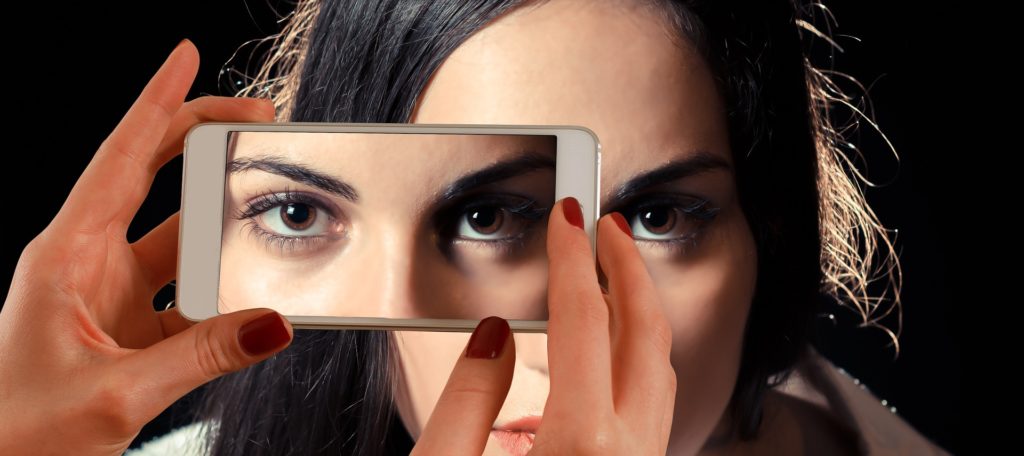- Calls to this hotline are currently being directed to Within Health, Fay or Eating Disorder Solutions
- Representatives are standing by 24/7 to help answer your questions
- All calls are confidential and HIPAA compliant
- There is no obligation or cost to call
- Eating Disorder Hope does not receive any commissions or fees dependent upon which provider you select
- Additional treatment providers are located on our directory or samhsa.gov
Relationship Between Body Shaming and Social Media Use

If you take a good look around you, there is no question that more and more people these days are engaged in some form of social media, either on smartphones, tablets, computers, and everything in between.
Statistics show us that there are over 2.3 billion active social media users, with Internet users having an average of 5.5 social media accounts [1].
The number of individuals who will engage in a social media platform is only growing, with social media users rising by 176 million in the last year [1]. There are 1 million new active mobile social users added each day, which rounds out to about roughly 12 people each second [1].
The Impact of Social Media on Body Image
These statistics are startling and a confirmation of the rapid way in which communication has changed. Face to face interactions have become more scarce in the place of digital communications, and more people have become accustomed to sharing glimpses of their lives through carefully crafted and filtered images. With this drastic change in how we view ourselves and each other, one must consider the impact of social media use on body image.
Poor body image is a reality that many individuals face on a daily basis – both women and men. Considering how submersed our culture has become within social media, it is important to consider the possible connection between social media use and body image. A study completed by the Dove Beauty company found that more women than ever are looking to social media for beauty inspiration, though this influence is not always a positive one.
Out of a sample of women surveyed for the study, over 75 percent felt that the portrayal of women on social media is unrealistic [2]. Even so, many women are influenced by the images they see online.
Other research has shown that social media use is associated with body image concerns, especially if the users are engaging in certain kinds of activities on social media, such as making appearance comparisons to others [3]. These effects are similar to those that are observed from traditional media, such as magazine advertisements, television commercials, etc.
Learning to Protect Your Own Body Image
 Regardless of what research shows, it is important to approach your social media use mindfully and understand the individual impact it may be having on your own life.
Regardless of what research shows, it is important to approach your social media use mindfully and understand the individual impact it may be having on your own life.
- Do you find yourself spending excessive time scrolling through your networks and feeds?
- Do you feel more negative about yourself after being on social media?
If so, these are important feelings to examine more closely. Consider taking a break from social media or being more proactive to follow accounts that are uplifting and encouraging. Building a positive body image can happen one step at a time through proactive steps, starting with examining your social media use.
 About the Author: Crystal is a Masters-level Registered Dietitian Nutritionist (RDN) with a specialty focus in eating disorders, maternal/child health and wellness, and intuitive eating. Combining clinical experience with a love of social media and writing, Crystal serves as the Director of Content and Social Media for Eating Disorder Hope/Addiction Hope, where her passion to help others find recovery and healing is integrated into each part of her work.
About the Author: Crystal is a Masters-level Registered Dietitian Nutritionist (RDN) with a specialty focus in eating disorders, maternal/child health and wellness, and intuitive eating. Combining clinical experience with a love of social media and writing, Crystal serves as the Director of Content and Social Media for Eating Disorder Hope/Addiction Hope, where her passion to help others find recovery and healing is integrated into each part of her work.
As a Certified Intuitive Eating Counselor, Crystal has dedicated her career to helping others establish a healthy relationship with food and body through her work with EDH/AH and nutrition private practice.
References:
[1]: “Marketing: 96 Amazing Social Media Statistics and Facts for 2016” https://www.brandwatch.com/blog/96-amazing-social-media-statistics-and-facts-for-2016/[2]: “New study shows impact of social media on beauty standards”, http://nytlive.nytimes.com/womenintheworld/2015/04/03/new-study-shows-impact-of-social-media-on-beauty-standards/
[3]: Fardouly, Jasmine. Et al. Social Media and Body Image Concerns: Current Research and Future Directions. Current Opinions in Psychology 9:1-5 June 2016
The opinions and views of our guest contributors are shared to provide a broad perspective of eating disorders. These are not necessarily the views of Eating Disorder Hope, but an effort to offer discussion of various issues by different concerned individuals.
We at Eating Disorder Hope understand that eating disorders result from a combination of environmental and genetic factors. If you or a loved one are suffering from an eating disorder, please know that there is hope for you, and seek immediate professional help.
Reviewed By: Jacquelyn Ekern, MS, LPC on January 16, 2017
Published on EatingDisorderHope.com

The EatingDisorderHope.com editorial team comprises experienced writers, editors, and medical reviewers specializing in eating disorders, treatment, and mental and behavioral health.

